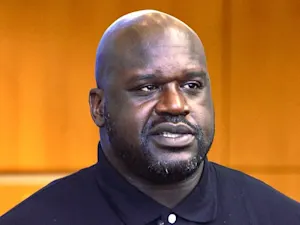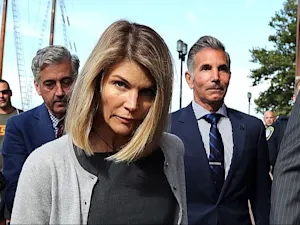
Jen Psaki's 'Blink Four Times' Joke Causes Uproar
Press Secretary Jen Psaki deliver remarks and answers questions from members of the press Friday, October 22, 2021, in the James S. Brady Press Briefing Room. Official White House Photo by Katie Ricks. Public domain.
When former White House Press Secretary and current MSNBC host Jen Psaki took a sharp turn from political commentary to personal speculation on her podcast, she lit a firestorm of outrage. On the October 2025 episode of the "I've Had It" podcast, Psaki suggested that Second Lady Usha Vance might be "afraid" of her husband, Vice President J.D. Vance, and offered to "come over" and save her if Usha blinked four times. What was meant as a biting critique of Vance's ambition spiraled into a scandalous moment that many called sexist and dismissive of serious issues like domestic abuse.
A Sharp Critique Turns Personal
Jen Psaki, known for her sharp political insights and former role as White House Press Secretary, was discussing J.D. Vance's political ambitions and his role in the Trump administration when the conversation took a dramatic detour. Psaki described Vance as a "little Manchurian candidate" who wants to be president more than anything else, as reported by the New York Post. She went on to say that Vance is "scarier" than President Trump "in certain ways," highlighting his youth, ambition and political agility.
But then Psaki crossed a line that sent shockwaves through social media and political circles. She speculated about what might be going on in the mind of Usha Vance, jokingly asking if she was okay and telling her to "blink four times" if she needed help, as reported by the New York Post. Psaki's offer to "come over" and save her was meant as a sarcastic jab but was widely seen as a cruel and inappropriate comment about a private marriage.
The Backlash Was Immediate and Fierce
The podcast episode's description itself echoed the joke, urging Usha Vance to "please blink twice if you need help," as reported by the New York Post. This only fueled the backlash. Social media erupted with criticism, calling Psaki's remarks "disgusting" and "vile." Many accused her of trivializing domestic abuse and mocking a woman's marriage for political theater.
Fox News contributor Joe Concha called the comments "Not a good person. At all," as reported by the New York Post. The popular Libs of TikTok X account slammed Psaki for "smearing" J.D. Vance and suggesting his wife wanted to leave him, demanding MSNBC be ashamed for paying her salary. Conservative voices on Twitter and X piled on, with one user sarcastically noting that Psaki's own husband might need saving after her remarks, as reported by MEAWW.
Even White House Director of Communications Steven Cheung publicly condemned Psaki's comments, accusing her of projecting personal issues onto others and calling her a "dumba--" for making untrue statements, as reported by the New York Post. Townhall.com writer Amy Curtis pointed out that "Usha Vance is happily married," and that Psaki's words insult women who are in genuinely abusive relationships.
The Vances: A Picture of Strength and Partnership
Usha and J.D. Vance have been visible figures on the political stage, often appearing together at events and diplomatic missions. For instance, according to the New York Post, social media commentary from a Turning Point USA contributor noted that Usha was accompanying J.D. Vance in Israel during efforts to secure a Gaza peace deal.
The couple's public appearances and statements suggest a strong partnership, making Psaki's comments not only offensive but also factually questionable. Many online defended the Vances, emphasizing their commitment to each other and condemning the use of personal attacks as political weapons.
When Political Critique Becomes Personal
Psaki's remarks reveal a dangerous trend where political commentary slips into personal territory, weaponizing private lives for public spectacle. While critiquing a politician's policies and ambitions is fair game, speculating about a spouse's feelings or safety crosses a line that many believe should never be breached.
The "blink for help" joke, while perhaps intended as dark humor, struck a nerve because it touched on sensitive issues of domestic abuse and marital privacy. It also opened a window into the intense scrutiny and pressure faced by political families, where every gesture and word can be twisted into scandal.
The Podcast That Sparked a Firestorm
The "I've Had It" podcast, where Psaki made these comments, is known for its candid and often provocative discussions. But this episode took an unexpected turn, shifting from political analysis to a personal attack that overshadowed the original topic.
Listeners and critics alike were stunned by the tone and content of Psaki's remarks. The backlash was swift and widespread, with calls for accountability and apologies. Yet, as of now, Psaki and MSNBC have not issued a public statement addressing the controversy.
What This Means for Political Discourse
Jen Psaki's "blink for help" joke serves as a cautionary tale about the boundaries of political commentary. It highlights how quickly public figures can ignite controversy when they blur the lines between professional critique and personal attack.
As political tensions continue to rise in 2025, moments like these underscore the need for respect and responsibility in public discourse. The personal lives of political families deserve privacy and dignity, even amid the fiercest debates.
References: MSNBC's Jen Psaki jokes Usha Vance is afraid of her VP husband - ripped for 'vile' comments | Jen Psaki slammed for saying JD Vance's wife Usha is scared of him: 'What an awful thing to say'
























